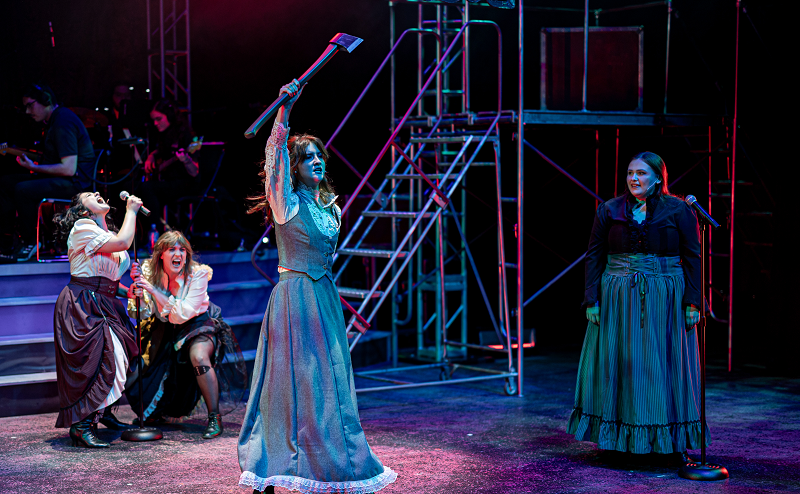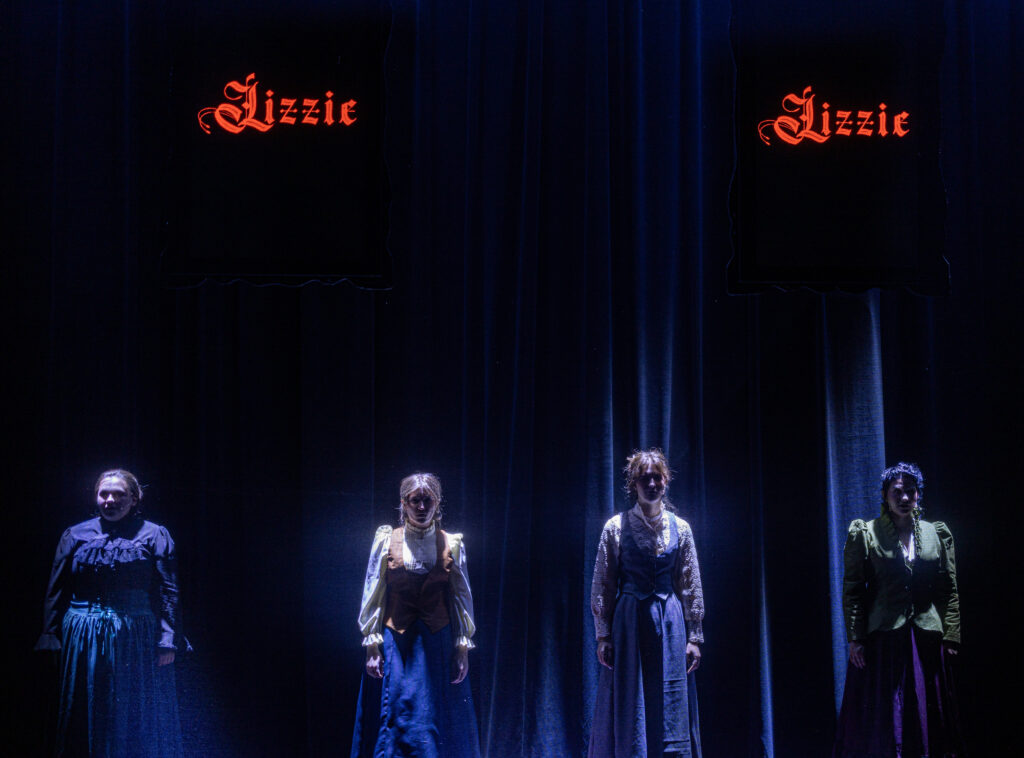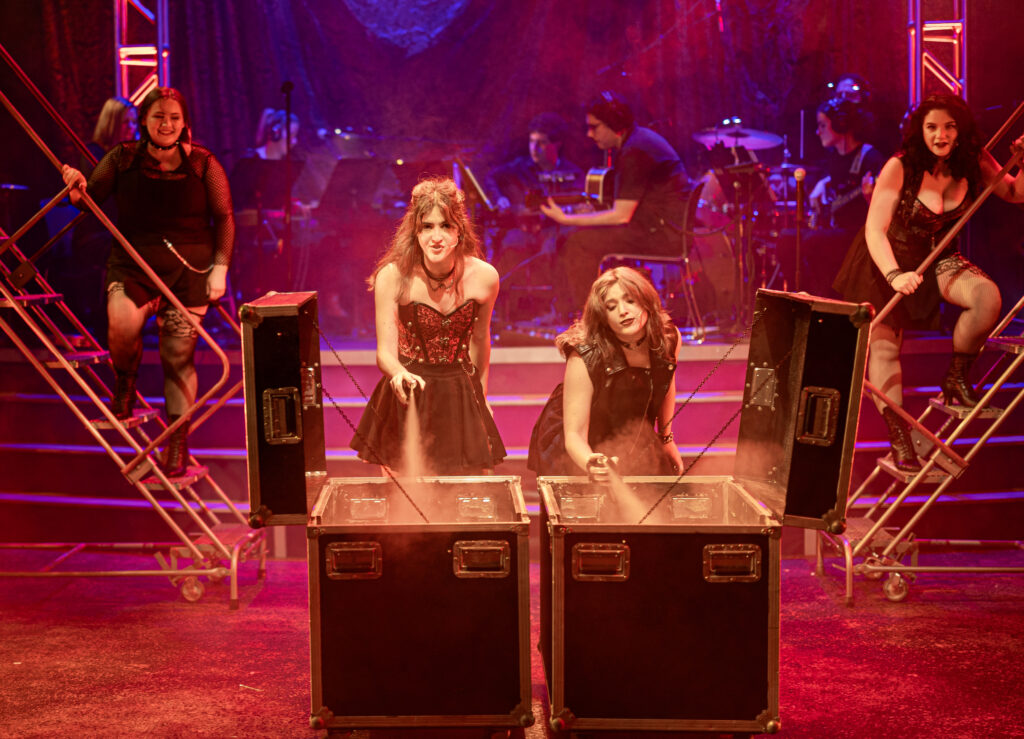
‘Lizzie: The Musical’ – Music by Steven Cheslik-deMeyer and Alan Stevens Hewitt; Lyrics by Steven Cheslik-deMeyer and Tim Maner; Book by Tim Maner; Additional Music by Tim Maner; Additional Lyrics by Alan Stevens Hewitt; Based on an original concept by Alan Stevens Hewitt; Orchestrations by Alan Stevens Hewitt. Produced by Brian Boruta; Directed and Choreographed by Ilyse Robbins; Music Director Lianne Bunting; Lighting Designer SeifAllah Salotto Cristobal; Sound Designer James Cannon; Scenic Designer Erik D. Diaz; Costume Designer Bethany Mullins. Presented by The Umbrella Stage Company at 40 Stow St., Concord, MA, through November 5th.
by Mike Hoban
“Lizzie Borden took an axe,
And gave her mother forty whacks,
When she saw what she had done,
She gave her father forty-one.”
That gruesome child’s rhyme from the late 19th century is both the inspiration and the opening lines from Lizzie: The Musical, Umbrella Stage Company’s early Halloween present to rock musical fans. This punk rock-flavored headbanger of a show shakes up the genre much the way the 1973 musical stage production of The Rocky Horror Show did 50 years earlier. Only instead of being fueled by dark humor and (then) norm-pushing sexcapades, it’s a far more serious feminist revenge story – and just as entertaining.
The narrative focuses on the days leading up to the “unsolved” murders (although book and lyric writers Steven Cheslik-deMeyer and Tim Maner make it crystal clear who they think swung the axe) and the subsequent media-fueled “trial-of-the-century” that followed. The show opens with the four characters introducing themselves: There’s Lizzie; her older sister Emma; Alice, the next-door neighbor and friend to Lizzie; and Bridget Sullivan (Nora Sullivan), the maid whom the Borden girls insist on calling Maggie, the name of the previous maid. Lizzie speaks last. “My name is Lizzie Andrew Borden. Not Elizabeth. Lizzie. Andrew – after my father. I was so christened. I am innocent. I leave it to my council to speak for me.”

We learn early on that all is not what it seems in “The House of Borden,” where all hell broke loose that August night in 1892. The Borden’s millionaire father is reviled by the residents of Fall River, but inside the house, there are far more personal reasons for the daughters to despise their dad – years of sexual abuse of at least one of his daughters. He’s also cutting them out of his will and leaving it all to their stepmom. As if that weren’t enough, Mr. Borden heaps further cruelty on Lizzie by destroying one of the few things in the world that provides her with love and solace – her beloved pigeons – right before the night of the murders.
Much of the score is straight-ahead rockers like “Sweet Little Sister” (sung by the leather-lunged Liza Giangrande as Emma), and there’s a handful of scream-singing numbers (“What the F#%k Now, Lizzie?” and “Why Are All These Heads Off?”). But it’s not all angry rock. There are some lovely softer pieces as well, including “If You Knew” (wonderfully sung by Temma Beaudreau, who plays Lizzie’s friend Alice, who would like to be more than friends) and the creepy “This Is Not Love” where Lizzie (an appropriately tortured Sophia Muharram) makes it clear that her father is sexually abusing her. Despite the concert feel, director Ilyse Robbins wrings three-dimensional performances out of this talented cast, and while there are no traditional dance numbers, Robbins’ prodigious choreography skills are on display as evidenced by the way the players move onstage, not to mention the nods to girl group synchronized dancing in some of the ensemble numbers.

Erik D. Diaz’ set is essentially a concert stage, with two large screens looming over the action, featuring photos of the unfortunate (but possibly deserving) victims of the brutal crime. The screens morph as the action moves along and are later used to display actual newspaper clippings from the trial. Costume designer Bethany Mullins convincingly replicates the women’s period attire in Act I and goes all in with an 80’s MTV-style punk leather and fishnet look for the cast in Act II.
Because Lizzie is largely a sung-through quasi-opera/concert, the story can be a little difficult to follow in spots, so it’s worth familiarizing yourself with the story before you go. The show succeeds best as a staged concert with four kick-ass singers who can really rock. As an aging punker myself, I could admire the edgy artistry, but for those whose theater experience and taste veers more to lighthearted musical comedies, some of the material may be a bit jarring. That being said, it’s precisely the type of musical (much like Jagged Little Pill) that is designed to appeal to a broader demographic than the typical (mostly older and white) audiences that make up today’s theatergoing base. (Check out this :46-second trailer if you want a taste of the show). If you want to see what it would look like if True Crime and Rock n Roll had a baby, you won’t want to miss Lizzie: The Musical. For tickets and information, go to: https://theumbrellaarts.org/production/lizzie-musical


I wanted to like it but couldn’t.